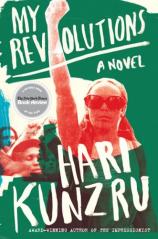Reading Group Guide
Discussion Questions
My Revolutions

1. Hari Kunzru has been compared to everyone from Zadie Smith to Tom Wolfe to Evelyn Waugh to P. G. Wodehouse. Have you read any of his other books? What other writers, if any, did you think of while reading My Revolutions?
2. Kunzru deftly juggles several themes in this novel: the need to belong, home, loyalty, identity, power, and others. Which theme(s) came to the forefront for you, and why?
3. Time and memory are very fluid in Chris Carver’s narration. Why do you think Kunzru assembled the layers the way he did? What was the effect?
4. The title of the novel is My Revolutions, not My Revolution. Why? What exactly were Chris/Mike’s revolutions?
5. On page 7, Mike says Miranda has “a knack for living in the world.” What does he mean by that? Why does he believe he lacks such a capacity? Which of his revolutionary friends shared this lack, and which were more like Miranda?
6. Discuss the women in Chris/Mike’s life: his mother, Maggie, Anna, Miranda, Sam. How did each contribute to his development, and to his decision at the end of the novel?
7. How did Mike’s belief that he’d seen Anna alive contribute to his behavior toward Miles in Chichester? Was the reappearance of both Anna and Miles just a coincidence, or can you think of another explanation?
8. As an adolescent, Chris follows his brother’s lead in setting fire to a despised neighbor’s storefront, though the fire fizzled. How does this foreshadow the events of the late sixties? Is Chris’s participation in later events similarly heedless?
9. The concept of privacy comes into play throughout the novel, including when Chris loses his virginity while someone else watches. Why do you think privacy --- or more specifically, the lack of it --- was so important to the revolutionaries?
10. Reread the paragraph that begins on the bottom of page 78. What do you think about the epiphany Chris has in prison? Do you agree with his assertion that there are two worlds? How does this idea play out in his later life?
11. On page 101, Sean tells Chris, “Always stay in your movie.” What does he mean by this? Does Chris take his advice? If he did, was it effective?
12. Is Chris really a “compulsive believer,” as he says on page 167? Why or why not?
13. Discuss the concept of collectivity: “Nothing would work unless it was practiced by disciplined groups of people, who were aware of each other’s strengths and weaknesses, the level of risk they were individually prepared to take” (page 119). How did Workshop Thirteen approach collectivity? Were they successful? How did it break down?
14. When Chris’s group begins to set off bombs, the press ignores their results. How does this escalate things? Would such a media silence be possible today? Can you think of parallels in current events?
15. On page 188, Chris recalls his group’s increasing isolation and its effects: “Discipline, certainty: the way they seem to bleed into one another, to blur at their borders. Because I am disciplined I am certain. Because I am certain, I am disciplined.” How might things have been different if they hadn’t become so insular? Where is the danger in discipline, in certainty?
16. Discuss the character of Miles. At what point did you begin to question his motives? Were your suspicions correct?
17. On page 230, Mike speaks directly to Sam in his narration. Do you think the entire novel is directed at her? Why or why not?
18. When Chris helps the old man and his wife in Manchester, how and why is that a turning point for him?
19. Why does Chris go to Miles’s houseboat? What does he hope to accomplish? Why does he lie about Anna’s involvement?
20. The contemporary framework of the novel is set in the late 1990s. Why do you think Kunzru set it pre–9/11? Does it have anything to do with Miles’s assertion on page 259: “Ideology’s dead now. Everyone pretty much agrees on how to run things”?
21. Reread the paragraph that begins on the bottom of page 276. What do you interpret this to mean? Does Mike do as Miles asks? How does the story end?
My Revolutions
- Publication Date: December 30, 2008
- Paperback: 288 pages
- Publisher: Plume
- ISBN-10: 0452290023
- ISBN-13: 9780452290020







